#reading year in review
Text
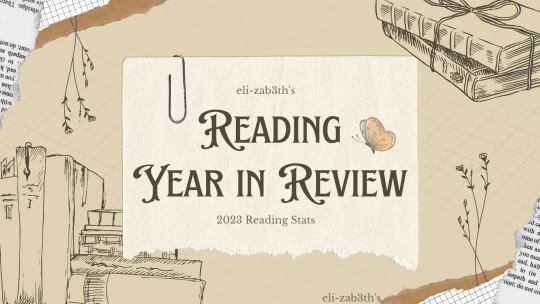
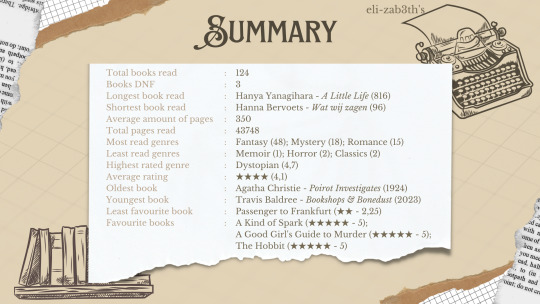
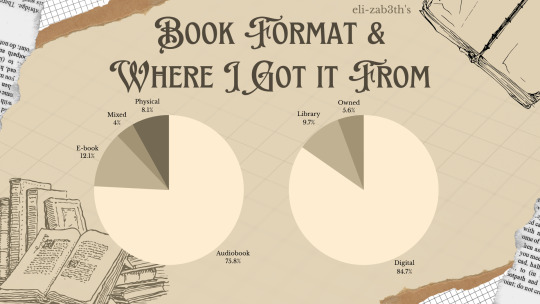
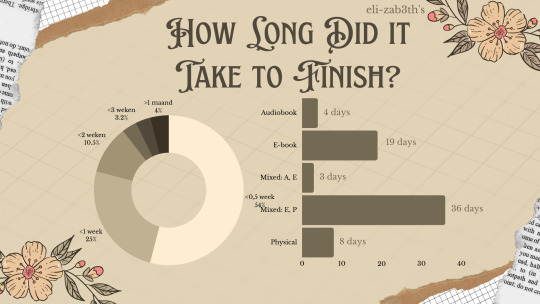
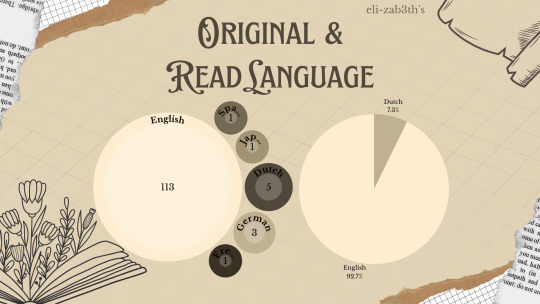
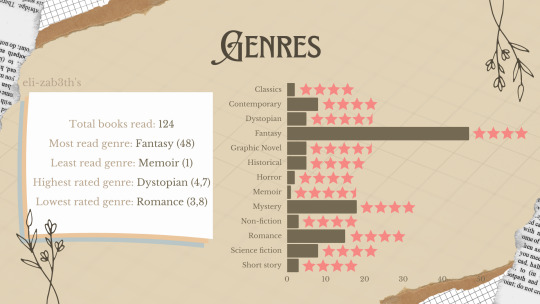
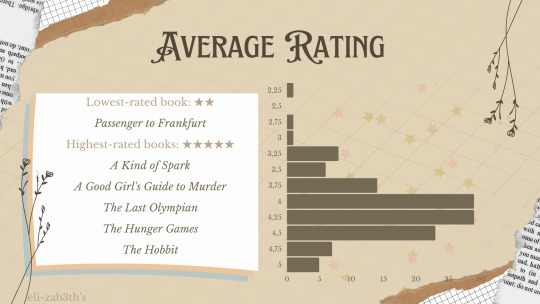

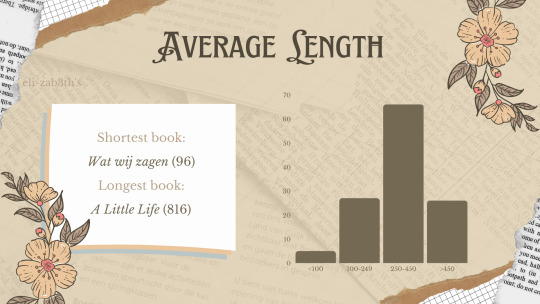
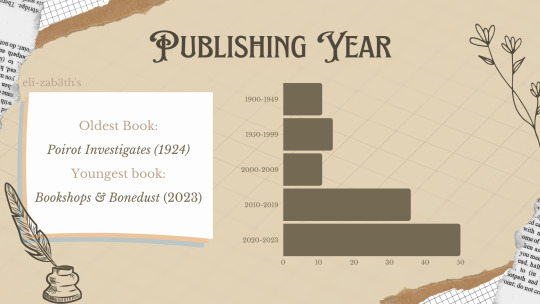
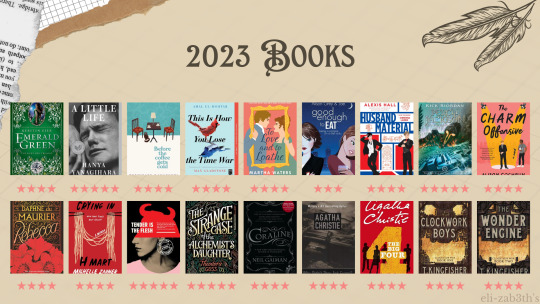
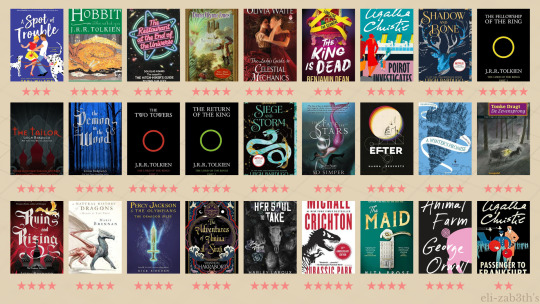
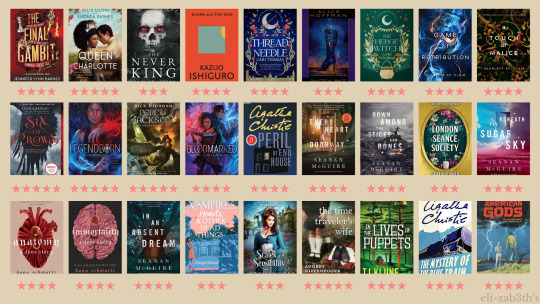
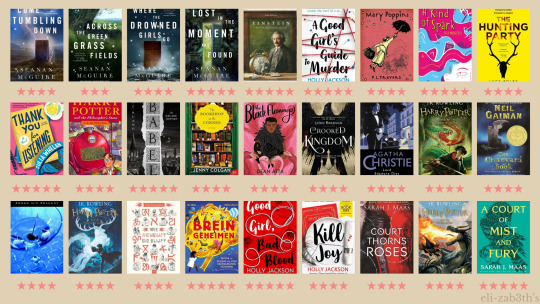
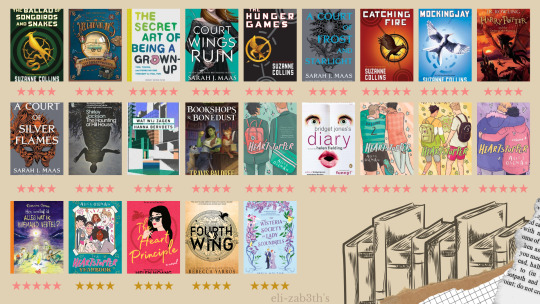
My 2023 Reading Year in Review!
For more details, see my Goodreads page or The Storygraph
#book journal#reading journal#reading stats#reading year in review#year in review#bullet journal#book stats#goodreads#reading wrap-up#the storygraph#year in books
78 notes
·
View notes
Text
Squash's Book Roundup 2023
Last year I read 67 books. This year my goal was 70, but I very quickly passed that, so in total I read 92 books this year. Honestly I have no idea how I did it, it just sort of happened. My other goal was to read an equal amount of fiction and nonfiction this year (usually fiction dominates), and I was successful in that as well. Another goal which I didn’t have at the outset but which kind of organically happened after the first month or so of reading was that I wanted to read mostly strange/experimental/transgressive/unusual fiction. My nonfiction choices were just whatever looked interesting or cool, but I also organically developed a goal of reading a wider spread of subjects/genres of nonfiction. A lot of the books I read this year were books I’d never heard of, but stumbled across at work. Also, finally more than 1/3 of what I read was published in the 21st century.
I’ll do superlatives and commentary at the end, so here is what I read in 2023:
-The Commitments by Roddy Doyle
-A Simple Story: The Last Malambo by Leila Guerriero
-The Hero With A Thousand Faces by Joseph Campbell
-Uzumaki by Junji Ito
-Chroma by Derek Jarman
-The Emerald Mile: The epic story of the fastest ride in history through the Grand Canyon by Kevin Fedarko
-Venus by Suzan-Lori Parks
-The Hearing Trumpet by Leonora Carrington
-Sacred Sex: Erotic writings from the religions of the world by Robert Bates
-The Virginia State Colony For Epileptics And The Feebleminded by Molly McCully Brown
-A Spy In The House Of Love by Anais Nin
-The Sober Truth: Debunking the bad science behind 12-step programs and the rehab industry by Lance Dodes
-The Sailor Who Fell From Grace With The Sea by Yukio Mishima
-The Aliens by Annie Baker
-The Criminal Child And Other Essays by Jean Genet
-Aimee and Jaguar: A Love Story, Berlin 1943 by Erica Fischer
-The Master And Margarita by Mikhail Bulgakov
-The Mustache by Emmanuel Carriere
-Maldoror by Comte de Lautreamont
-Narrow Rooms by James Purdy
-At Your Own Risk by Derek Jarman
-Escape From Freedom by Erich Fromm
-Countdown: A Subterranean Magazine #3 by Underground Press Syndicate Collective
-Fabulosa! The story of Britain's secret gay language by Paul Baker
-The Golden Spruce: A true story of myth, madness and greed by John Vaillant
-Querelle de Roberval by Kevin Lambert
-Fire The Bastards! by Jack Green
-Closer by Dennis Cooper
-The Woman In The Dunes by Kobo Abe
-Opium: A Diary Of His Cure by Jean Cocteau
-Worker-Student Action Committees France May '68 by Fredy Perlman and R. Gregoire
-Capitalist Realism by Mark Fisher
-The Sound Of Waves by Yukio Mishima
-One Day In My Life by Bobby Sands
-Corydon by Andre Gide
-Noopiming by Leanne Betasamosake Simpson
-Man Alive: A true story of violence, forgiveness and becoming a man by Thomas Page McBee
-The Artist's Reality: Philosophies of Art by Mark Rothko
-Damage by Josephine Hart
-Schoolgirl by Osamu Dazai
-The Passion According to G.H. by Clarice Lispector
-The Sex Revolts: Gender, Rebellion and Rock n Roll by Simon Reynolds and Joy Press
-The Traffic Power Structure by planka.nu
-Bird Man: The many faces of Robert Straud by Jolene Babyak
-Seven Dada Manifestos by Tristan Tzara
-The Journalist by Harry Mathews
-Bullshit Jobs by David Graeber
-Moscow To The End Of The Line by Venedikt Erofeev
-Morvern Callar by Alan Warner
-The Poetics Of Space by Gaston Bachelard
-A Boy's Own Story by Edmund White
-The Coming Insurrection by The Invisible Committee
-Jesus' Son by Denis Johnson
-Notes From The Sick Room by Steve Finbow
-Artaud The Momo by Antonin Artaud
-Doctor Rat by William Kotzwinkle
-Recollections Of A Part-Time Lady by Minette
-trans girl suicide museum by Hannah Baer
-The 99% Invisible City by Roman Mars
-Sweet Days Of Discipline by Fleur Jaeggy
-Breath: The new science of a lost art by James Nestor
-What We See When We Read by Peter Mendelsund
-The Cardiff Tapes (1972) by Garth Evans
-The Ark Sakura by Kobo Abe
-Mad Like Artaud by Sylvere Lotringer
-The Story Of The Eye by Georges Bataille
-Little Blue Encyclopedia (For Vivian) by Hazel Jane Plante
-Blood And Guts In High School by Kathy Acker
-Summer Fun by Jeanne Thornton
-Splendid's by Jean Genet
-VAS: An Opera In Flatland by Steve Tomasula
-Sorry I'm Late, I Didn't Want To Come: One introvert's year of saying yes by Jessica Pan
-Whores For Gloria by William T. Vollmann
-The Notebooks by Jean-Michel Basquiat, Larry Walsh (editor)
-L'Astragale by Albertine Sarrazin
-The Decay Of Lying and other essays by Oscar Wilde
-The Immortal Life Of Henrietta Lacks by Rebecca Skloot
-Open Throat by Henry Hoke
-Prisoner Of Love by Jean Genet
-The Fifth Wound by Aurora Mattia
-The Communist Manifesto by Karl Marx
-My Friend Anna: The true story of a fake heiress by Rachel DeLoache Williams
-Mammother by Zachary Schomburg
-Building The Commune: Radical democracy in Venezuela by George Cicarello-Maher
-Blackouts by Justin Torres
-Cheapjack by Philip Allingham
-Near To The Wild Heart by Clarice Lispector
-The Trayvon Generation by Elizabeth Alexander
-Skye Papers by Jamika Ajalon
-Exercises In Style by Raymon Queneau
-Tender Buttons by Gertrude Stein
-The Feather Thief: Beauty, Obsession, and the Natural History Heist of the Century by Kirk Wallace Johnson
~Some number factoids~
I read 46 fiction and 46 nonfiction. One book, The Fifth Wound by Aurora Mattia, is fictionalized/embellished autobiography, so it could go half in each category if we wanted to do that, but I put it in the fiction category.
I tried to read as large a variety of nonfiction subjects/genres as I could. A lot of the nonfiction I read has overlapping subjects, so I’ve chosen to sort by the one that seems the most overarching. By subject, I read: 5 art history/criticism, 5 biographies, 1 black studies, 1 drug memoir, 2 essay collections, 2 history, 2 Latin American studies, 4 literary criticism, 1 music history, 2 mythology/religion, 1 nature, 4 political science, 2 psychology, 5 queer studies, 2 science, 1 sociology, 1 travel, 2 true crime, 3 urban planning.
I also read more queer books in general (fiction and nonfiction) than I have in years, coming in at 20 books.
The rest of my commentary and thoughts under a cut because it's fairly long
Here’s a photo of all the books I read that I own a physical copy of (minus Closer by Dennis Cooper which a friend is borrowing):
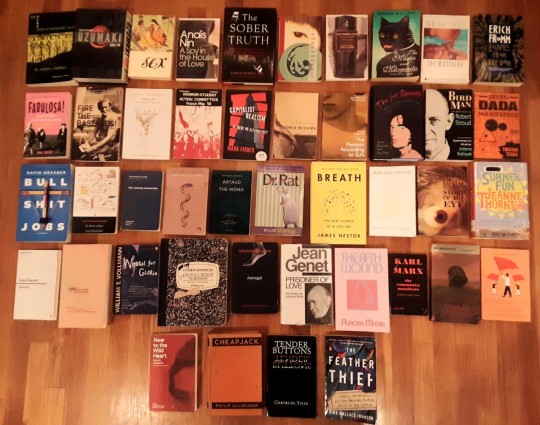
~Superlatives and Thoughts~
I read so many books this year I’m going to do a runner-up for each superlative category.
Favorite book: This is such a hard question this year. I think I gave out more five-star ratings on Goodreads this year than I ever have before. The books that got 5 stars from me this year were A Simple Story: The Last Malambo by Leila Guerriero, Capitalist Realism by Mark Fisher, The Emerald Mile by Kevin Fedarko, The Mustache by Emmanuel Carriere, The Passion According to GH by Clarice Lispector, trans girl suicide museum by Hannah Baer, The Fifth Wound by Aurora Mattia, Mammother by Zachary Schomburg, and Blackouts by Justin Torres.
But I think my favorite book of the year was The Fifth Wound by Aurora Mattia. It is an embellished, fictionalized biography of the author’s life, chronicling a breakup that occurred just before she began her transition, and then a variety of emotional events afterward and her renewal of a connection with that person after a number of years had passed. The writing style is beautiful, extremely decadent, and sits in a sort of venn diagram of poetry, theory, fantasy and biography. My coworker who recommended this book to me said no one she’d recommended it to had finished it because they found it so weird. I read the first 14 pages very slowly because I didn’t exactly know what the book was doing, but I quickly fell completely in love with the imagery and the formatting style and the literary and religious references that have been worked into the book both as touchstones for biography and as vehicles for fantasy. There is a video I remember first seeing years ago, in which a beautiful pinkish corn snake slithers along a hoop that is part of a hanging mobile made of driftwood and macrame and white beads and prism crystals. This was the image that was in the back of my head the entire time I was reading The Fifth Wound, because it matched the decadence and the strangeness and the crystalline beauty of the language and visuals in the book. It is a pretty intense book, absolutely packed with images and emotion and ideas and preserved vignettes where reality and fantasy and theory overlap. It’s one of those books that’s hard to describe because it’s so full. It’s dense not in that the words or ideas are hard to understand, but in that it’s overflowing with imagery and feelings, and it feels like an overflowing treasure chest.
Runner-up:The Mustache by Emmanuel Carriere. However, this book wins for a different superlative, so I’ve written more about it there.
Least favorite book: Querelle de Roberval by Kevin Lambert. I wrote a whole long review of it. In summary, Lambert’s book takes its name from Querelle de Brest, a novel by Jean Genet, and is apparently meant to be an homage to Genet’s work. Unfortunately, Lambert seems to misunderstand or ignore all the important aspects of Genet’s work that make it so compelling, and instead twists certain motifs Genet uses as symbols of love or transcendence into meaningless or negative connotations. He also attempts to use Genet’s mechanic of inserting the author into the narrative and allowing the author to have questionable or conflicting morals in order to emphasize certain aspects of the characters or narrative, except he does so too late in the game and ends up just completely undermining everything he writes. This book made me feel insulted on behalf of Jean Genet and all the philosophical thought he put into his work.
Runner-up: What We See When We Read by Peter Mendelsund. This graphic designer claims that when people read they don’t actually imagine what characters look like and can’t conjure up an image in their head when asked something like “What does Jane Eyre look like to you?” Unfortunately, there’s nothing scientific in the book to back this up and it’s mostly “I” statements, so it’s more like “What Peter Mendelsund Sees (Or Doesn’t See) When He Reads”. It’s written in what seems to be an attempt to mimic Marshall McLuhan’s style in The Medium Is The Massage, but it isn’t done very well. I spent most of my time reading this book thinking This does not reflect my experience when I read novels so I think really it’s just a bad book written by someone who maybe has some level of aphantasia or maybe is a visual but not literary person, and who assumes everyone else experiences the same thing when they read.
(Another runner-up would be The Hero With A Thousand Faces by Joseph Campbell, but I think that’s a given because it’s an awful piece of revisionist, racist trash, so I won’t write a whole thing about it. I can if someone wants me to.)
Most surprising/unexpected book: The Mustache by Emmanuel Carriere. This book absolutely wins for most surprising. However, I don’t want to say too much about it because the biggest surprise is the end. It was the most shocking, most unexpected and bizarre endings to a novel I’ve read in a long time, and I absolutely loved it. It was weird from the start and it just kept getting weirder. The unnamed narrator decides, as a joke, to shave off the moustache he’s had for his entire adult life. When his wife doesn’t react, he assumes that she’s escalating their already-established tradition of little pranks between each other. But then their mutual friends say nothing about the change, and neither do his coworkers, and he starts spiral into confusion and paranoia. I don’t want to spoil anything else because this book absolutely blew me away with its weirdness and its existential dread and anyone who likes weird books should read it.
Runner-up: Morvern Callar by Alan Warner. I don’t even know what compelled me to open this book at work, but I’m glad I did. The book opens on Christmas, where the main character, Morvern, discovers her boyfriend dead by suicide on the kitchen floor of their flat. Instead of calling the police or her family, she takes a shower, gets her things and leaves for work. Her narrative style is strange, simultaneously very detached and extremely emotional, but emotional in an abstract way, in which descriptions and words come out stilted or strangely constructed. The book becomes a narrative of Morvern’s attempts to find solitude and happiness, from the wilderness of Scotland to late night raves and beaches in an unnamed Mediterranean city. The entire book is scaffolded by a built-in playlist. Morvern’s narrative is punctuated throughout by accounts of exactly what she’s listening to on her Walkman. The narrative style and the playlist and the bizarre behavior of the main character were not at all what I was expecting when I opened the book, but I read the entire book in about 3 hours and I was captivated the whole time. If you like the Trainspotting series of books, I would recommend this one for sure.
Most fun book: The Emerald Mile by Kevin Fedarko. This book was amazing. It was like reading an adventure novel and a thriller and a book on conservationism all wrapped into one and it was clearly very passionately written and it was a blast. I picked it up because I was pricing it at work and I read the captions on one of the photo inserts, which intrigued me, so I read the first page, and then I couldn’t stop. The two main narratives in the book are the history of the Grand Canyon (more specifically the damming of the Colorado River) and the story of a Grand Canyon river guide called Kenton Grua, who decided with two of his river guide friends to break the world record for fastest boat ride down the Colorado River through the Grand Canyon. The book is thoroughly researched, and reaches back to the first written record of the canyon, then charts the history of the canyon and the river up to 1983 when Grua made his attempt to race down the river, and then the aftermath and what has happened to everyone in the years since. All of the historical figures as well as the “current” figures of 1983 come to life, and are passionately portrayed. It’s a genuine adventure of a book, and I highly recommend it.
Runner-up: Summer Fun by Jeanne Thornton. It asks “What if Brian Wilson of the Beach Boys was actually a trans woman?” Actually, that’s not quite it. It asks “What if a trans woman living in poverty in southwest America believed to an almost spiritual level that Brian Wilson was a trans woman?” The main character and narrator, Gala, is convinced that the lead singer of her favorite band, the Get Happies, (a fictional but fairly obvious parallel to the Beach Boys) is a trans woman. Half the book is her writing out her version of the singer’s life history, and the other half is her life working at a hostel in Truth Or Consequences, New Mexico, where she meets a woman who forces her out of her comfort zone and encourages her to face certain aspects of her self and identity and her connection with others. It’s a weird novel, and definitely not for everyone, but it’s fun. I was reading it on the train home and I was so into it that I missed my stop and had to get off at the next station and wait 20 minutes for the train going back the other way.
Book that taught me the most: Breath: The new science of a lost art by James Nestor. In it, Nestor explores why humans as a general population are so bad at breathing properly. He interviews scientists and alternative/traditional health experts, archaeologists, historians and religious scholars. He uses himself as a guinea pig to experiment with different breathing techniques from ancient meditation styles to essentially overdosing on oxygen in a lab-controlled environment to literally plugging his nose shut to only mouth-breathe for two weeks (and then vice-versa with nose breathing). It was interesting to see a bunch of different theories a laid out together regarding what kind of breathing is best, as well as various theories on the history of human physiology and why breathing is hard. Some of it is scientific, some pseudoscience, some just ancient meditation techniques, but he takes a crack at them all. What was kind of cool is that he tries every theory and experiment with equal enthusiasm and doesn’t really seem to favor any one method. Since he’s experimenting on himself, a lot of it is about the effects the experiments had on him specifically and his experiences with different types of breathing. His major emphasis/takeaway is that focusing on breathing and learning to change the ways in which we breathe will be beneficial in the long run (and that we should all breath through our noses more). While I don’t think changing how you breathe is a cure-all (some of the pseudoscience he looks at in this book claims so) I certainly agree that learning how to breath better is a positive goal.
Runner-up: The Sober Truth by Lance Dodes. I say runner-up because a lot of the content of the book is things that I had sort of vague assumptions about based on my knowledge of addiction and AA and mental illness in general. But Dodes put into words and illustrated with numbers and anecdotes and case studies what I just kind of had a vague feeling about. It was cool to see AA so thoroughly debunked by an actual psychiatrist and in such a methodical way, since my skepticism about it has mostly been based on the experiences of people I know in real life, anecdotes I’ve read online, or musicians/writers/etc I’m a fan of that went through it and were negatively affected.
Most interesting/thought provoking book: Mammother by Zachary Schomburg. The biggest reason this book was so interesting is because the little world in which it exists is so strange and yet so utterly complete. In a town called Pie Time (where birds don’t exist and the main form of work is at the beer-and-cigarettes factory) a young boy called Mano who has been living his childhood as a girl decides that he is now a man and that it’s time for him to grow up. As this happens, the town is struck by an affliction called God’s Finger. People die seemingly out of nowhere, from a hole in their chest, and some object comes out of the hole. Mano collects the things that come out of these holes, and literally holds them in order to love them, but the more he collects, the bigger he becomes as he adds objects to his body. A capitalist business called XO shows up, trying to convince the people of Pie Time that they can protect themselves from God’s Finger with a number of enterprises, and starts to slowly take over the town. But Mano doesn’t believe death is something that should be run from. This book is so pretty, and the symbolism/metaphors, even when obvious, feel as though they belong organically in the world. A quote on the back of the book says it is “as nearly complete a world as can be”, and I think that’s a very accurate description. The story is interesting, the characters are compelling, and the magical realist world in which the story exists is fascinating.
Runner up: trans girl suicide museum by Hannah Baer. This is a series of essays taken (for the most part) from Baer’s blog posts. They span a chunk of time in which she writes her thoughts and musings on her experience transition and transgender existence in general. It is mostly a series of pieces reflecting on “early” stages of transition. But I thought it was really cool to see an intellectual and somewhat philosophical take on transition, written by someone who has only been publicly out for a few years, and therefore is looking at certain experiences with a fresh gaze. As the title suggests, a lot of the book is a bit sad, but it’s not all doom and gloom. A lot of the emphasis is on the important of community when it comes to the experience of starting to transition and the first few years, and the importance of community on the trans experience in general. I really liked reading Hannah Baer’s thoughts as a queer intellectual who was writing about this stuff as she experienced it (or not too long after) rather than writing about the experience of early transition years and years down the line. It meant the writing was very sharp and the emotion was clear and not clouded by nostalgia.
Other thoughts/commentary on books I don’t have superlatives for:
I’m glad my first (full) book read in 2023 was A Simple Story: The Last Malambo by Leila Guierrero. It’s a small, compact gem of a book that follows the winner of an Argentinian dance competition. The Malambo is a traditional dance, and the competition is very fierce, and once someone wins, they can never compete again. The author follows the runner-up of the previous year, who has come to compete again. It paints a vivid picture of the history of the dance, the culture of the competition, and the character of the dancer the author has chosen to follow. It’s very narrowly focused, which makes it really compelling.
The Hearing Trumpet by Leonora Carrington could have easily won for most fun or most interesting book. Carrington was a surrealist writer and painter (and was in a relationship with Max Ernst until she was institutionalized and he was deported by the Nazis). In The Hearing Trumpet, an elderly woman called Marian is forced by her family to go live in an old ladies’ home. The first strange thing about the place is that all of the little cabins each woman lives in is shaped like some odd object, like an iron, or ice cream, or a rabbit. The other old women at the institution are a mixed bag, and the warden of the place is hostile. Marian starts to suspect that there are secrets, and even witchcraft involved, and she and a few of the other ladies start to try and unravel the occult mysteries hidden in the grounds of the home. The whole book is fun and strange, and the ending is an extremely entertaining display of feminist occult surrealism.
Sacred Sex: Erotica writings from the religions of the world by Robert Bates was a book I had to read for research for my debunking of Withdrawn Traces. It was really very interesting, but it was also hilarious to read because maybe 5% of any of the texts included were actually erotic. It should have been called “romantic writings from the religions of the world” because so little of the writing had anything to do with sex, even in a more metaphorical sense.
Every time I read Yukio Mishima I’m reminded how much I love his style. The Sailor Who Fell From Grace With The Sea almost usurped The Temple of the Golden Pavilion as my favorite Mishima novel. I’m fascinated with the way that Mishima uses his characters to explore the circumstance of having very intense feelings or reactions towards something and simultaneously wanting to experience that, while also wanting to have complete control and not feel them at all. There’s a scene in this novel where Noboru and his friends brutally kill and dissect a cat; it’s an intense and vividly rendered scene, made all the more intense by Noboru desperately conflicted between feeling affected by the killing and wanting to force himself to feel nothing. The amazing subtle theme running through the book is the difference between Noboru’s intense emotions and his desire/struggle to control them and subdue them versus Ryuji’s more subtle emotion that grows through the book despite his natural reserve. I love endings like the one in this book, where it “cuts to black” and you don’t actually see the final act, it’s simply implied.
In 2016 or 2017, I ran lights for a showcase for the drama department at UPS (I can’t remember now what it was) that included a bunch of scenes from various plays. I remember a segment from Hir by Taylor Mac, and a scene from The Aliens by Annie Baker. In the scene that I saw, one of the characters describes how when he was a boy, he couldn’t stop saying the word ladder, and the monologue culminates in a full paragraph that is just the word “ladder.” I can’t remember who was acting in the one that I saw at UPS, but that monologue blew me away, the way that one word repeated 127 conveyed so much. This year a collection of Annie Baker’s plays came in at work so I sat down and read the whole play and it was just incredible. I’d love to see the full play live, it’s absolutely captivating.
Narrow Rooms by James Purdy was a total diamond in the rough. It takes place in Appalachia, in perhaps the 1950s although it’s somewhat hard to tell. It follows the strange gay entanglement between four adult men in their 20s, who have known each other all their lives. It traces threads of bizarre codependency, and the lines crossed between love and hate. The main character, Sidney, has just returned home after serving a sentence for manslaughter. On his return, he finds that an old lover has been rendered disabled in an accident, and that an old school rival/object of obsession has been waiting for him. This rival, nicknamed “The Renderer” because of an old family occupation, has been watching Sidney all their lives. Both of them hate the other, but know that they’re destined to meet in some way. Caught in the middle of their strange relationship are Gareth, Sidney’s now-disabled former lover, and Brian, a young man who thinks he’s in love with The Renderer. The writing style took me some time to get used to, as it is written as though by someone who has taught themselves, or has only had basic classes on fiction writing. But the plot itself is so strange and the characters are so stilted in their own internality that it actually fits really well. Like The Mustache, this book had one of the strangest, most intensely visceral and shocking endings I’ve read in a while. It was also “one that got away.” I read it at work, then put it on my staff picks shelf, and only realized after someone else bought it that I should have kept it for myself.
The Passion According to G.H. by Clarice Lispector blew my mind. I really don’t want to spoil any of it, but I highly encourage anyone who hasn’t read it to do. The build in tension is perfect and last 30 pages are just incredible. Lispector’s style is so unique and so beautiful and tosses out huge existential questions like it’s nothing, and I love her work so much.
Moscow To The End Of The Line by Venedikt Erofeev was another really unexpected book. It’s extremely Russian (obviously) and really fun until suddenly it isn’t. The main character, a drunkard, gets on a train from Moscow to Petushki, the town at the end of the line (hence the title), in order to see his lover. On the way, he befriends the other people in his train car and they all steadily get drunker and drunker, until he falls asleep and misses his stop. Very Russian, somewhat strange, and I was surprised that it was written in the late 60s and not the 30s.
Dr. Rat by William Kotzwinkle was what I expected. Weird in a goofy way, a bit silly even when it’s serious, and rather heavy-handed satire. The titular Dr Rat is a rat who has spent his whole life in a laboratory and has gone insane. The other animals who are being tested on want to escape, but he’s convinced that all the testing is for the good of science and wants to thwart their rebellion. Unfortunately, all the other animals who are victims of human cruelty/callousness/invasion/deforestation/etc around the world are also planning to rebel, connection with each other through a sort of psychic television network. It’s a very heavy-handed environmentalist/anti-animal cruelty metaphor and general societal satire, but it’s silly and fun too.
Confessions Of A Part-Time Lady by Minette is a self-published, nearly impossible to find book that came into my work. It’s self-printed and bound, and was published in the 70s. It is the autobiographical narrative of a trans woman who did drag and burlesque and theatre work all across the midwest, as well as New York and San Francisco, from the 1930s up to the late 60s. It was originally a series of interviews by the two editors, who published it in narrative form, and it includes photos from Minette’s personal collection. It’s an amazing story, and a glimpse into a really unique time period of gender performance and queer life. She even mentions Sylvia Rivera, specifically when talking about gay activism. She talks about how the original group of the Gay Liberation Front was an eclectic mix of all sorts of people of all sexualities and genders and expressions. Then when the Gay Activists Alliance “took over”, they started pushing out people who were queer in a more transgressive or unusual way and there was more encouragement on being more heteronormative. She mentions Sylvia Rivera and Marsha P Johnson, saying “I remember Sylvia Rivera who founded STAR – Street Transvestite Action Revolutionaries. She was always trying to say things – the same kinds of things Marsha P Johnson says in a sweeter way – and they treated her like garbage. If that’s what ‘order’ is, haven’t we had enough?”
Whores For Gloria by William T Vollmann was exactly as amazing as I thought it would be. I love Vollmann’s style, because you can tell that even though the characters he’s writing about are characters, they’re absolutely based on people that he met or saw or spoke to in real life. The main character, Jimmy, is searching for his former lover, Gloria, who has either died or left him (it is unclear for most of the novel). He begins to use tokens bought from sex workers (hair, clothes, etc) to attempt to conjure her into reality, and when that doesn’t work, he pays them to tell him stories from their lives, and through their lives he tries to conjure Gloria. This novel’s ending had extremely similar vibes to the ending of Moscow To The End Of The Line.
Prisoner Of Love by Jean Genet was a lot to take in. It was weird reading it at this moment in time, and completely unplanned. It’s just that I have only a few more books to read before I’ve made my way through all Genet’s works that have been translated into English, and it was next on the list. Most of the book focuses on Genet’s time spent in Palestine in the 70s and his short return in the 80s. He also discusses the time he spent with the Black Panthers in the US, although it’s not the main subject of the book. Viewing Palestine from the point of view of Genet’s weird philosophical and moral worldview was really interesting, because what he chooses to spend time looking at or talking about is probably not what most would focus on, and because even his most political discussions are tinged with the uniquely Genet-style spirituality (if you can call it that? I don’t know what to call it) that is so much the exact opposite of objective. It’s definitely not a book about Palestine I would recommend reading without also having a grasp of Genet’s style of looking at the world and his various obsessions and preoccupations, because they really do inform a lot of his commentary. It was also written 15 years after his first trip to Palestine, partly from memory and partly from journal entries/notes, which gives it a sort of weirdly dreamlike quality much like his novels.
Blackouts by Justin Torres was so amazing! It blends real life and fiction together so well that I didn’t even realize that most of the people he references in the novel are real historical figures until he mentioned Ben Reitman, who I recognized as the Chicago King Of The Hobos and Emma Goldman’s lover. The book follows an unnamed narrator who has come to a hotel or apartment in the southwest in order to care for a dying elderly man called Juan Gay. Juan has a book called Sex Variants, a study of homosexuality from the 1940s which has been censored and blacked out. Back and forth, the narrator and Juan trade stories. The narrator tells his life story up until the present, including his first meeting with Juan in a mental hospital as a teenager. In turn, Juan tells the story of the Sex Variants book and its creator, Jan Gay (Ben Reitman’s real life daughter). The book explores the reliability of narrative, the power of collecting and documenting life stories, and of removing or changing things in order to create new or different narratives.
Again, Clarice Lispector rocking my world! Generally I can read a 200-ish page novel in somewhere between 2 and 4 hours depending on the content/writing style. Near To The Wild Heart took me 9 hours to read because I kept wanting to stop and reread entire paragraphs because they were so interesting or pretty or philosophical. The story focuses on Joana, whose strange way of looking at the world and going through life makes everyone sort of wary of her. This book is so layered I don’t really know how to describe it. So much of it is philosophical or existential musings through the vehicle of Joana. Unsurprisingly, it’s a beautiful book and I highly recommend it.
I’m just going to copy/paste my Goodreads review for Skye Papers by Jamika Ajalon: This book had so much potential that just…fell short. I could tell that it was written for an American audience but the way the reader/Skye is “taught” certain British terms and/or slang felt a bit patronizing. The characters were fleshed out and interesting and I liked them a lot but the plot crumbled quickly in the last half of the book Things sped up to a degree that felt strange and unnatural, the book’s pacing was inconsistent throughout. Perhaps that was deliberate considering the reveal at the climax, but if it was, it should have been utilized better. If the inconsistent pacing wasn’t deliberate, then it just made the book feel strange to read. There were moments were I felt like there should have been more fleshing out of certain character relationships. Even with the reveal at the end and the explanation of Pieces’ erratic/avoidant behavior, I wish there had been more fleshing out of the relationship or friendship between her and Skye at the beginning, when Skye first arrives in London. Characters who seemed cool/interesting got glossed over and instead there was a lot more dwelling on Skye walking around or busking or just hanging out. I could have gone without the last 30 or so pages after the big reveal, where Skye went back through everything that happened with the knowledge she (and the reader) had gained. It dragged on and on and at that point I felt like the whole story was so contrived that I just wasn’t interested anymore. A friend who read this book before I did said she thought it was an experimental novel that just hadn’t gone far enough, and I completely agree with her. I think if the style with the film script interludes went further, into printed visuals or more weirdness with the interludes, more experimental style with the main story, or something, it would have been really good. It just didn’t push hard enough.
The Feather Thief by Kirk Wallace Johnson was a fun little true crime novel about a young flautist who broke into a small English natural history museum in 2009 and stole hundreds of thousands of pounds worth of preserved rare bird skins dating back to the 19th century. He was a salmon fly-tying enthusiast and prodigy, and old Victorian fly designs used feathers of rare birds. The book first goes through the heist and the judicial proceedings, then examines the niche culture of Victorian fly-tying enthusiasts and obsessives, and then chronicles the author’s attempts to track down some of the missing birds. It was a quick, easy read, but fun and an unusual subject and I quite enjoyed it.
In 2024 I don’t plan on trying to surpass or even reach this year’s number. I’m going to start off the year reading The Recognitions by William Gaddis, then I’m going to re-read a number of books that I come across at work or in conversation and think Huh, I should reread that one of these days. So far, the books I am currently planning to reread: Sometimes A Great Notion by Ken Kesey, As I Lay Dying by William Faulkner, The People Of Paper by Salvador Plascencia, Mrs Dalloway by Virginia Woolf, The Mustache by Emmanuel Carriere, McGlue by Otessa Moshfegh, Long Day’s Journey Into Night by Eugene O’Neil, Acid Snow by Larry Mitchell, and Nightwood by Djuna Barnes.
#reading list#book list#book roundup#reading list year in review#books#squash rambles#reading year in review#book list roundup
6 notes
·
View notes
Text
it drives me bonkers the way people don't know how to read classic books in context anymore. i just read a review of the picture of dorian gray that said "it pains me that the homosexual subtext is just that, a subtext, rather than a fully explored part of the narrative." and now i fully want to put my head through a table. first of all, we are so lucky in the 21st century to have an entire category of books that are able to loudly and lovingly declare their queerness that we've become blind to the idea that queerness can exist in a different language than our contemporary mode of communication. second it IS a fully explored part of the narrative! dorian gray IS a textually queer story, even removed from the context of its writing. it's the story of toxic queer relationships and attraction and dangerous scandals and the intertwining of late 19th century "uranianism" and misogyny. second of all, i'm sorry that oscar wilde didn't include 15k words of graphic gay sex with ao3-style tags in his 1890 novel that was literally used to convict him of indecent behaviour. get well soon, i guess...
#the picture of dorian gray#lit#this is a pointless text post#guess what i read for the first time in the year of our lord 2023#and yes this is a real review on storygraph that i took a screenshot of. you people are so stupid god bless#girl he literally censored it himself did your edition have 0 introduction or background at all#greatest (s)hits#book discourse
68K notes
·
View notes
Text
My Year in Books
It's been a sad year for reading, filled with moments of absolute pleasure and long stretches of nothingness. No, that's not true. It is actually more that I was diving deep into some fandoms and the majority of my reading was fanfiction.
Sixteen books read and 5569 pages total. January and November/December were the most read months.
Mysteries led the way with seven books. Also making appearances were fantasy and romance, followed by science fiction.
The overall rating for the year was 3.61, meaning most of my reads were okay, nothing great. Only three books hit the 5 star rating:
All the Dead Shall Weep by Charlaine Harris
Payback in Death by J. D. Robb
Starter Villain by John Scalzi (also my favorite book of the year)
0 notes
Text
Spotted the word "blorbo" in The New York Times book review. Listen NYT romance reviewer, I really do not think your paper's audience is going to recognize that one
10K notes
·
View notes
Text

My Reading Year.
(My last @guardian Books cartoon for 2023)
4K notes
·
View notes
Text
So i felt like 2022 was kind of an underwhelming year when it comes to reading for me, because half the time i was in a horrible reading slump and when i did get around to finish a book i either read some of the worst books I've read in years or read some pretty decent 3 to 4 stars books tho i honestly wouldn't call them favorites if anyone asked but they were fun. I did have a couple of 5 stars even if one of them was a re-read. And at least i can say i tried a couple of books outside my comfort zone so that's good! Anyways here's the recap of my 2022 reads:
1. Las Cosas que perdimos en el Fuego (The things we lost in the fire) by Mariana Enríquez ⭐⭐⭐⭐
2. PTSD Radio [manga] by Masaaki Nakayama ⭐⭐⭐⭐
3. Aristotle and Dante Discover the Secrets of the Universe [re-read] by Benjamin Alire Sáenz ⭐⭐⭐⭐⭐
4. El túnel (The Tunnel) by Ernesto Sabato ------
5. The Charm Offensive by Alison Cochrun ⭐⭐½
6. The Under Dog and Other Stories feat. Hercule Poirot by Agatha Christie ⭐⭐⭐⭐
7. Several People are Typing by Calvin Kasulke ⭐⭐⭐⭐
8. Fried Green Tomatoes at the Whistle Stop Cafe by Fannie Flagg ⭐⭐⭐⭐
9. It Ends With Us by Colleen Hoover ⭐⭐⭐
10. It Starts With Us by Colleen Hoover ⭐⭐⭐
11. A Christmas Carol by Charles Dickens ⭐⭐⭐⭐
12. The Broken Girls by Simone St. James ⭐⭐⭐½
13. The Love Hypothesis by Ali Hazelwood ⭐
14. Sasaki to Miyano [manga] by Shou Harusono ⭐⭐⭐⭐⭐
0 notes
Text
My 2022 Reading Year in Review
happy new year, friends! i cant believe it is actually 2023. i know everyone says this, but it is because it is true – i truly feel like its 2019 still. 2023? i can’t wrap my mind around it! but i am sending you so much love and i hope this year is really safe and happy for you and your loved ones. since september, i feel like i have really fallen back into organically picking up books and adding…
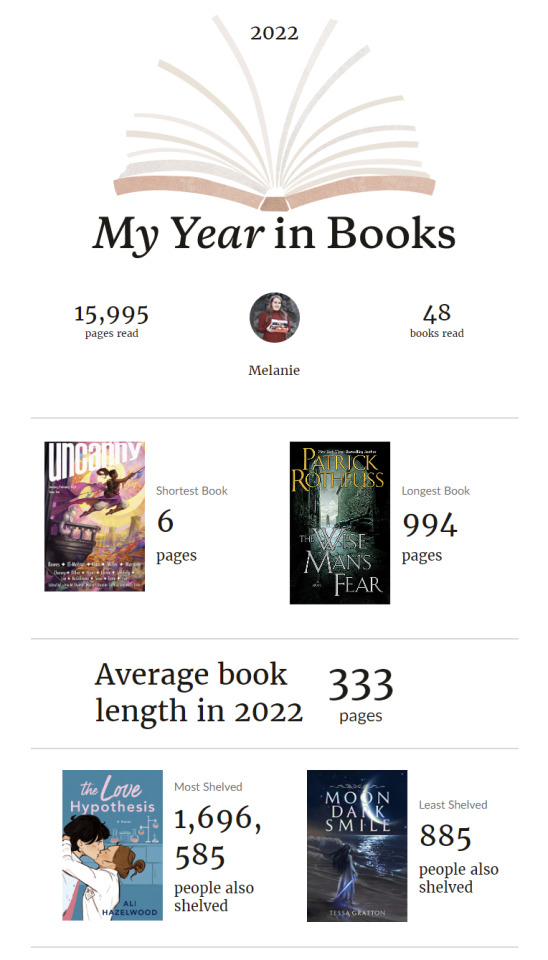
View On WordPress
#Book Blog#book blooger#End of Year#meltotheany#reading statistics#reading stats#Reading Year In Review#Year in Review#Year Reading Wrap Up#Year Wrap UP
0 notes
Text
I got back into reading this year so here’s my 2022 reading wrap up
✨📚Physical 🎧 Audio Book 💻 Digital book ✨
📚Geek Love- Katherine Dunn
📚A Far Wilder Magic - Allison Saft
📚Anatomy: A Love story -Dana Schwartz
📚Song Of Achilles- Madeline Miller
📚The Girl Who Kept Winter- Giao Chi
💻Gothikana- RuNyx
📚Nothing But Black Teeth - Cassandra Khaw
💻Harrow Faire book 1-6 - Kathryn Ann Kingsley
* The Contortionist
* The Puppeteer
* The Clown
* The Ringmaster
* The Faire
*The Astonishing Strande Brothers
💻If We Were Villans -M.L Rio
💻Tenebris series book 1-3 -Kayhryn Ann Kingsley
* Of Visions & Secrets
* Of Flesh & Bone
* Of Grave & Glory
📚Belladonna- Adalyn Grace
📚Down Comes The Night -Allison Saft
🎧 A Court of Thrones and Roses- Sarah J Mass
🎧 A Court of Mist and Fury - Sarah J Mass
🎧I’m Glad My Mom Died -Jennette McCurdy
📚Carmilla- Sheridan Le Fanu
📚 so much manga I’m not even going to list here. But one series I read and Really enjoyed was Hells Paradise.
✨Lets hope I read more in 2023 I have a long TBR ✨
1 note
·
View note
Text
2022 Reading Year in Review
Books finished this year:
Dracula - Bram Stoker (Dracula Daily)
From Beyond - H.P. Lovecraft
A midsummer night's dream - William Shakespeare
Frankenstein - Mary Shelley
Circe - Madeline Miller
Grandmaster of Demonic Cultivation 1,2,3,4 - Mo Xiang Tong Xiu
Heaven Official's Blessing 1,2 - Mo Xiang Tong Xiu
Favorites:
Grandmaster of Demonic Cultivation
Heaven Official's Blessing
Least favorite:
Circe - Madeline Miller
Book I haven't finished:
The Graveyard Book - Neil Gaiman
Currently reading:
Heaven Official's Blessing 3 - Mo Xiang Tong Xiu
Lord of the Rings - J.R.R. Tolkien (Lotr Newsletter)
Moby Dick - Herman Melville (Whale Weekly)
To be read:
the rest of Heaven Official's Blessing
Iron Widow - Xiran Jay Zhao
After Dark - Haruki Murakami
The Books of Magic - Neil Gaiman
I Am a Cat - Natsume Soseki
#reading year in review#books#books i read in 2022#eli's stuff#i think my love for reading is finally back ♡#annotating books makes reading easier and more fun#wish i knew this sooner haha#also shoutout to the tumblr book clubs#love you guys
1 note
·
View note
Text
Reading Year in Review
Not super impressive, but my excuse to talk about the books I really liked from this year + reflect on shit
Number of Books I Read: 11?
Shortest Book: Night of the Mannequin by Stephen Graham Jones
Longest Book: Apples Never Fall by Liane Moriarty
(These are approximations since both were audiobooks)
Books I Didn't Finish That I Don't Plan on Finishing: Cackle by Rachel Harrison
Books I'm Still Reading and Will Probably Finish (Eventually): A History of Wild Places by Shea Ernshaw, A Tree Grows in Brooklyn by Betty Smith, The Endurance by Alfred Lansing, Milltown by Kerri Arsenault, IT by Steven King, The Taking of Jake Livingston by Ryan Douglass, Last Night in Twisted River by John Irving
Favorite Author: Silvia Moreno-Garcia. Holy shit she is so fucking good
Favorite Book: Tie between Unbury Carol by Joshua Malerman (we stan James Moxie as a problematic fave) and Velvet was the Night by Silvia Moreno-Garcia (holy shit holy shit holy shit)
Book With the Most Anticipated Sequel: My Heart Is A Chainsaw by Stephen Graham Jones (only book with a sequel since it's part of a trilogy). Special props because the name of the sequel reminds me of Blue Öyster Cult lol
Freakiest Book: Nothing But Blackened Teeth by Cassandra Khaw
Most Depressing Book: Lizzie Bright and the Buckminster Boy by Gary D Schmidt and Evidence of Things Unseen by Marianne Wiggins
Book that Disappointed Me the Most: Apples Never Fall by Liane Moriarty. It was a dumb, good domestic drama until about 75% in and then it got boring. Sigh.
Thoughts: Oh idk, maybe be better about not picking up 6 books at once and then getting distracted? My tastes are also all over the place lol
#Book Year in Review#reading year in review#silvia Moreno-Garcia#joshua Malerman#unbury carol#velvet was the night#mexican gothic#nothing but blackened teeth#cassandra khaw#my heart is a Chainsaw#reading#books#mango tag
0 notes
Text
you want a new kind of guy, fine, i raise you: the lady i was briefly roommates with in college who once smoked a blunt at a party and then spent an hour confessing earnestly to me that she genuinely preferred reading detailed episode recaps over actually watching the tv show in question
#she sounded so remorseful & i just stood staring like an anthropologist watching their phd thesis spontaneously manifest before their eyes#apparently she would watch the pilot episode to get a feel for the characters#and then just read a bunch of recaps & episode reviews instead of watching future episodes. what fresh steaming hell#this conversation took place like a year and a half after we were roommates btw. i had seen her maybe twice in that time period#i thought she was a standard frat girl but then 18 months later she appears in the wild grass to reveal unhinged character background to me#and i'm just standing there nodding feeling like i missed a weird opportunity i did not want or ask for#honestly thought i was the weirdest person in that apartment situation but now i'm wondering what our other 2 roommates were hiding#not my strangest college experience at ALL but like. definitely top 20#this wasn't the same person as Aquarium Girl btw but oddly enough they were roommates actually#(not at the same time that Recaps Lady and i were roommates but at different intervals idk)#anyway i probably should have interviewed at more than one apartment before taking over a sublease but summer sess is a weird time u know#oh and this happened in Hong Kong btw
3K notes
·
View notes
Text
Squash’s Book Roundup of 2022
This year I read 68 books. My original goal was to match what I read in 2019, which was 60, but I surpassed it with quite a bit of time to spare.
Books Read In 2022:
-The Man Who Would Be King and other stories by Rudyard Kipling
-Futz by Rochelle Owens
-The Threepenny Opera by Bertolt Brecht
-Funeral Rites by Jean Genet
-The Grip of It by Jac Jemc
-Jules et Jim by Henri-Pierre Roche
-Hashish, Wine, Opium by Charles Baudelaire and Theophile Gautier
-The Blacks: a clown show by Jean Genet
-One, No One, One Hundred Thousand by Luigi Pirandello
-Cain’s Book by Alexander Trocchi
-The Man with the Golden Arm by Nelson Algren
-Three-Line Novels (Illustrated) by Felix Feneon, Illustrated by Joanna Neborsky
-Black Box Thrillers: Four Novels (They Shoot Horses Don’t They, Kiss Tomorrow Goodbye, No Pockets in a Shroud, I Should Have Stayed Home) by Horace McCoy
-The Dictionary of Accepted Ideas by Gustave Flaubert
-The Chairs by Eugene Ionesco
-Illusions by Richard Bach
-Mole People by Jennifer Toth
-The Rainbow Stories by William T Vollmann
-Tell Me Everything by Erika Krouse
-Equus by Peter Shaffer (reread)
-Ghosty Men by Franz Lidz
-A Happy Death by Albert Camus
-Six Miles to Roadside Business by Michael Doane
-Envy by Yury Olesha
-The Day of the Locust by Nathaniel West
-Thus Spoke Zarathustra by Friedrich Nietzsche
-The Riddle of the Labyrinth: The Quest to Crack an Ancient Code by Margalit Fox
-The Cat Inside by William S Burroughs
-Under The Volcano by Malcolm Lowry
-Camino Real by Tennessee Williams (reread)
-The Private Memoirs and Confessions of a Justified Sinner by James Hogg
-The Quick & The Dead by Joy Williams
-Comemadre by Roque Larraquy
-The Zoo Story by Edward Albee
-The Bridge by Hart Crane
-A Likely Lad by Peter Doherty
-The Stranger in the Woods: The Extraordinary Story of the Last True Hermit by Michael Finkel
-The Law In Shambles by Thomas Geoghegan
-The Anti-Christ by Friedrich Nietzche
-The Maids and Deathwatch by Jean Genet
-Intimate Journals by Charles Baudelaire
-The Screens by Jean Genet
-Inferno by Dante Alighieri (reread)
-The Quarry by Friedrich Durrenmatt
-A Season In Hell by Arthur Rimbaud (reread)
-Destruction Was My Beatrice: Dada and the Unmaking of the Twentieth Century by Jed Rasula
-Pere Ubu by Alfred Jarry
-Bitter Fame: A Life of Sylvia Plath by Anne Stevenson
-Loot by Joe Orton
-Julia And The Bazooka and other stories by Anna Kavan
-The Haunting of Lin-Manuel Miranda by Ishmael Reed
-If You Were There: Missing People and the Marks They Leave Behind by Francisco Garcia
-Detransition, Baby by Torrey Peters
-Indelicacy by Amina Cain
-Withdrawn Traces by Sara Hawys Roberts (an unfortunate but necessary reread)
-Sarah by JT LeRoy (reread)
-How Lucky by Will Leitch
-Gyo by Junji Ito (reread)
-Joe Gould’s Teeth by Jill Lepore
-Saint Glinglin by Raymond Queneau
-Bakkai by Anne Carson
-Reflections in a Golden Eye by Carson McCullers
-McGlue by Ottessa Moshfegh
-Moby Dick by Herman Melville
-The Hour of the Star by Clarice Lispector
-In the Forests of the Night by Amelia Atwater-Rhodes (reread from childhood)
-Chicago: City on the Make by Nelson Algren
-The Medium is the Massage by Malcolm McLuhan
~Superlatives And Thoughts~
Fiction books read: 48
Non-fiction books read: 20
Favorite book: This is so hard! I almost want to three-way tie it between Under The Volcano, The Quick & The Dead, and The Man With The Golden Arm, but I’m not going to. I think my favorite is Under The Volcano by Malcolm Lowry. It’s an absolutely beautiful book with such intense descriptions. The way that it illustrates the vastly different emotional and mental states of its three main characters reminded me of another favorite, Sometimes A Great Notion by Ken Kesey. Lowry is amazing at leaving narrative breadcrumbs, letting the reader find their way through the emotional tangle he’s recording. The way he writes the erratic, confused, crumbling inner monologue of the main character as he grows more and more ill was my favorite part.
Least favorite book: I’d say Withdrawn Traces, but it’s a reread, so I think I’ll have to go with Detransition, Baby by Torrey Peters. I dedicated a whole long post to it already, so I’ll just say that the concept of the book is great. I loved the whole idea of it. But the execution was awful. It’s like the exact opposite of Under The Volcano. The characters didn’t feel like real people, which would have been fine if the book was one written in that kind of surreal or artistic style where characters aren’t expected to speak like everyday people. But the narrative style as well as much of the dialogue was attempting realism, so the lack of realistic humanity of the characters was a big problem. The book didn’t ever give the reader the benefit of the doubt regarding their ability to infer or empathize or figure things out for themselves. Every character’s emotion and reaction was fully explained as it happened, rather than leaving the reader some breathing space to watch characters act or talk and slowly understand what’s going on between them. Points for unique idea and queer literature about actual adults, but massive deduction for the poor execution.
Unexpected/surprising book: The Riddle of the Labyrinth: The Quest to Crack an Ancient Code by Margalit Fox. This is the first book about archaeology I’ve ever read. I picked it up as I was shelving at work, read the inner flap to make sure it was going to the right spot, and then ended up reading the whole thing. It was a fascinating look at the decades-long attempt to crack the ancient Linear B script, the challenges faced by people who tried and the various theories about its origin and what kind of a language/script it was. The book was really engaging, the author was clearly very passionate and emotional about her subjects and it made the whole thing both fascinating and fun to read. And I learned a bunch of new things about history and linguistics and archaeology!
Most fun book: How Lucky by Will Leitch. It was literally just a Fun Book. The main character is a quadriplegic man who witnesses what he thinks is a kidnapping. Because he a wheelchair user and also can’t talk except through typing with one hand, his attempts to figure out and relay to police what he’s seen are hindered, even with the help of his aid and his best friend. But he’s determined to find out what happened and save the victim of the kidnapping. It’s just a fun book, an adventure, the narrative voice is energetic and good-natured and it doesn’t go deeply into symbolism or philosophy or anything.
Book that taught me the most: Destruction Was My Beatrice by Jed Rasula. This book probably isn’t for everyone, but I love Dadaism, so this book was absolutely for me. I had a basic knowledge of the Dadaist art movement before, but I learned so much, and gained a few new favorite artists as well as a lot of general knowledge about the Dada movement and its offshoots and members and context and all sorts of cool stuff.
Most interesting/thought provoking book: Moby Dick by Herman Melville. I annotated my copy like crazy. I never had to read it in school, but I had a blast finally reading it now. There’s just so much going on in it, symbolically and narratively. I think I almost consider it the first Modernist novel, because it felt more Modernist than Romantic to me. I had to do so much googling while reading it because there are so many obscure biblical references that are clear symbolism, and my bible knowledge is severely lacking. This book gave me a lot of thoughts about narrative and the construction of the story, the mechanic of a narrator that’s not supposed to be omniscient but still kind of is, and so many other things. I really love Moby Dick, and I kind of already want to reread it.
Other thoughts/Books I want to mention but don’t have superlatives for:
Funeral Rites was the best book by Jean Genet, which I was not expecting compared to how much I loved his other works. It would be hard for me to describe exactly why I liked this one so much to people who don’t know his style and his weird literary tics, because it really is a compounding of all those weird passions and ideals and personal symbols he had, but I really loved it.
Reading The Grip Of It by Jac Jemc taught me that House Of Leaves has ruined me for any other horror novel that is specifically environmental. It wasn’t a bad book, just nothing can surpass House Of Leaves for horror novels about buildings.
The Man With The Golden Arm by Nelson Algren was absolutely beautiful. I went in expecting a Maltese Falcon-type noir and instead I got a novel that was basically poetry about characters who were flawed and fucked up and sad but totally lovable. Plus it takes place only a few blocks from my workplace!
The Rainbow Stories by William T Vollmann was amazing and I totally love his style. I think out of all the stories in that book my favorite was probably The Blue Yonder, the piece about the murderer with a sort of split personality. Scintillant Orange with all its biblical references and weird modernization of bible stories was a blast too.
The Quick & The Dead by Joy Williams was amazing and one of my favorites this year. It’s sort of surreal, a deliberately weird novel about three weird girls without mothers. I loved the way Williams plays with her characters like a cat with a mouse, introducing them just to mess with them and then tossing them away -- but always with some sort of odd symbolic intent. All the adult characters talk and act more like teens and all the teenage characters talk and act like adults. It’s a really interesting exploration of the ways to process grief and change and growing up, all with the weirdest characters.
Joe Gould’s Teeth was an amazing book, totally fascinating. One of our regulars at work suggested it to me, and he was totally right in saying it was a really cool book. It’s a biography of Joe Gould, a New York author who was acquaintances with EE Cummings and Ezra Pound, among others, who said he was writing an “oral history of our time.” Lepore investigates his life, the (non)existence of said oral history, and Gould’s obsession with a Harlem artist that affected his views of race, culture, and what he said he wanted to write.
McGlue by Ottessa Moshfegh was so good, although I only read it because 3 out of my other 5 coworkers had read it and they convinced me to. I had read a bunch of negative reviews of Moshfegh’s other book, so I went in a bit skeptical, but I ended up really enjoying McGlue. The whole time I read it, it did feel a bit like I was reading Les Miserables fanfiction, partly from the literary style and partly just from the traits of the main character. But I did really enjoy it, and the ending was really lovely.
In terms of literature that’s extremely unique in style, The Hour Of The Star by Clarice Lispector is probably top of the list this year. Her writing is amazing and so bizarre. It’s almost childlike but also so observant and philosophical, and the intellectual and metaphorical leaps she makes are so fascinating. I read her short piece The Egg And The Chicken a few months ago at the urging of my coworker, and thought it was so cool, and this little novel continues in that same vein of bizarre, charming, half-philosophical and half-mundane (but also totally not mundane at all) musings.
I'm still in the middle of reading The Commitments by Roddy Doyle (my lunch break book) and The Hero With A Thousand Faces by Joseph Campbell, but I'm not going to finish either by the end of the year, so I'm leaving them off the official list.
#squash rambles#reading year in review#book list year in review#book list#reading list#book roundup#reading roundup
7 notes
·
View notes
Text
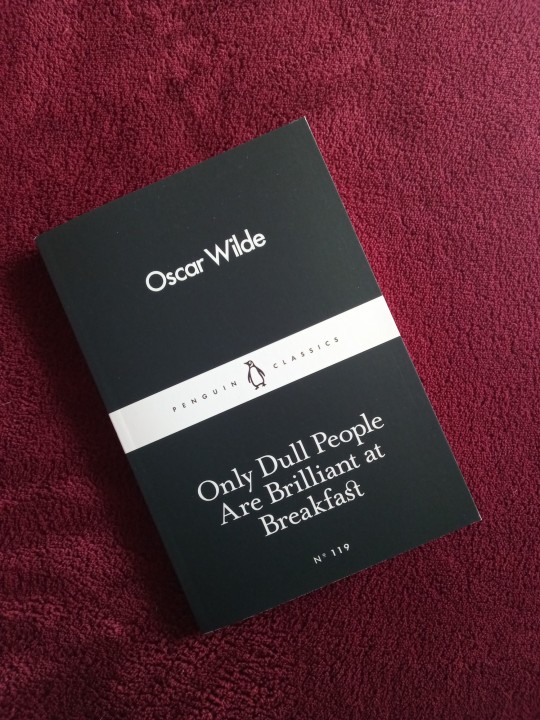
Only Dull People Are Brilliant At Breakfast by Oscar Wilde
I read this collection of quotes a couple of years ago, and ever since I have wanted a physical copy of this book. I decided it was finally time to get one and have a reread. I love Wilde and this collection of quotes feels a lot like a trip into his brain, it got me really motivated to finally pick up The Ballad Of Reading Gaol.
#if you dig into my blog you will also find my first review of this book#this post is mostly here to record that I reread this book this year#2024 book#bookblr#booklr#books#book review#book rec#reading#oscar wilde#mine#the---hermit#i thought i posted this weeks ago but apparently i had forgot oops
130 notes
·
View notes
Text

#kirby#daily kirby#my art#digital#hal laboratory#nintendo#so like aliexpress used to have a terrible reputation in terms of like quality and truth in advertising and such right#but like. amazon and etsy are swamped with bootleggers and dropshippers now too#so I figured like. can't be any worse right?#besides I know how to double check descriptions and measurements and examine images critically#I've shopped shady sites before like back when banggood was the only place to get those cute diy miniature kits#(now you can get them at regular craft store chains which is Wild to me)#but I have never opened aliexpress because everyone was always just like 'Never Go There'#(but then again these days folks are doing massive temu hauls left and right)#(so clearly norms have changed even if common perception of aliexpress has not)#I open it up and I immediately find the rug I spent an entire day hunting for unsuccessfully earlier in the month.#and a ton of incredible bootleg kirbs.#and a style of hair clip I've been hunting for for *years*.#soooo I spent the entire day in a pastel fugue lol#(I have not spent any money yet but I'm probably gonna)#(so like I can't confirm that you're not gonna get scammed or whatever just like. use common sense.)#(don't trust sale prices read descriptions/reviews when available and try to avoid work stolen from independent artists)#(that's usually gonna be on printed stuff like phone cases and posters)#(and tbh I have no qualms with stolen official art as long as the quality is as advertised)#(but there's a big difference between stealing from Multinational Corporation and stealing from Some Guy)#anyway done rambling now <3
145 notes
·
View notes
Note
hey :D I was wondering if you had any book recommendations on A) psychological horror fiction and B) nonfiction on topics which are generally considered taboo (e.g. cannibalism, cults)?
can't think of any books off the top of my head but i can recommend two podcasts: painfotainment by hardcore history, which examines the history of the death penalty and the changes in social and cultural attitudes to public execution, and the cults podcast (called "cults") hosted by greg poclyn and vanessa richardson, which looks at the history of various well and lesser-known cults and their leaders and members, and which i like because despite being a popular true crime podcast it doesn't overly sensationalize the events and people it covers or come across as exploitative and insensitive to the victims
172 notes
·
View notes